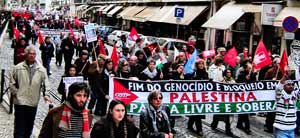Gaza massacre globally isolates Israeli settler state
By
John Catalinotto
Published Jan 29, 2009 8:42 PM
Israel’s savage assault on the civilian population of Gaza has aroused
the greatest worldwide outrage ever against the U.S.-backed settler state.
Perhaps nothing symbolized this more than the report of veteran anti-apartheid
fighter Dennis Brutus leading a protest in Durban, South Africa, against
Israeli Ambassador Dov Segev-Steinberg. Brutus was instrumental in the cultural
boycott campaign against apartheid South Africa in the 1980s and 1990s.
After watching three weeks of a horrific war against a people, the world is on
the verge of a campaign against the Israeli state similar to the one that
helped weaken the apartheid South Africa regime in that earlier period. This is
now known worldwide as the Campaign for Boycott, Divestment, Sanctions, or BDS,
which would involve massive refusal to buy from or invest in the major
corporations that operate in, support or provide repressive weapons to the
Israeli state.
|
Lisbon, Portugal. Jan. 24.
|
Nearly every group opposed to the Israeli occupation of Palestine or the latest
massacre in Gaza has raised the BDS Campaign as a way to proceed with the
struggle, from anti-globalization spokesperson Naomi Klein to the trade unions
of South Africa.
Many individuals, organizations and even countries are also mobilizing to bring
people-to-people aid to the Palestinians in Gaza on a humanitarian basis.
Venezuela has sent a team of 20 doctors, for example.
Protests continue worldwide
Even as the Israeli regime announced a cease-fire and planned withdrawal from
Gaza, some of the largest protests were taking place the weekend of Jan. 17.
Tens of thousands gathered in Islamabad and Karachi, Pakistan, and burned both
Israeli and U.S. flags. In almost every country there were protests that
weekend. In Asia there were protests in Srinigar, Kashmir; Kuala Lumpur,
Malaysia; Jakarta, Indonesia; Islamabad, Pakistan; and even occupied Kabul,
Afghanistan. In Ankara, Turkey, the people went to the U.S. Embassy where they
denounced the U.S. as a partner in the Israeli crimes.
In Europe 200,000 people marched in Rome while tens of thousands took to the
streets in London, Paris and Madrid, with other protests throughout the Spanish
state, including 15,000 in Santiago de Compostela, the capital of Galicia, on
Jan. 18. Other protests took place in the Scandinavian countries.
Protests Jan. 15 in Panama compared the killing of Palestinian civilians to the
1964 and 1989 U.S. assaults on Panamanian civilians. Demonstrations also took
place in Chile and Brazil.
Israeli Defense Minister Ehud Barak cancelled his visit to Tel Aviv University
on Jan. 19 after students called him a “murderer.” One war
resisters’ organization in the Israeli state, Courage to Refuse,
published a newspaper advertisement condemning the killing of hundreds of
Palestinian civilians and calling on soldiers to refuse to fight in Gaza.
With the cease-fire holding, most demonstrations were smaller the weekend of
Jan. 24 and aimed at specific targets to make a point. Some 1,500 people flew a
Palestinian flag over Lisbon, Portugal.
One of the most telling actions was the protest at the BBC in London, after
that media monopoly had refused to publicize an appeal for humanitarian aid to
Gaza. Unions at the BBC and church organizations throughout Britain joined the
ongoing protest against BBC’s management. Currently a broad section of
the population is campaigning to return licenses to the BBC, a type of boycott
campaign.
War crimes trials
There are attempts underway to bring charges of war crimes and crimes against
humanity against the Israeli rulers and military. There are at least two
initiatives on this. One is to bring charges through the International Criminal
Court (to see petition, visit tlaxcala.es and click on Campaigns). A second is
to attempt to have the United Nations General Assembly create a special
tribunal that would hear the case against Israel
(petitiononline.com/EAFORD09/).
Human Rights Watch, Amnesty International, the Gaza-based Palestinian Center
for Human Rights and B’tselem, the Israeli Center for Human Rights in the
Occupied Territories, have said Israel should be investigated for possible war
crimes.
While there are many obstacles to bringing such charges—for example,
neither the U. S. nor Israel recognizes the authority of the ICC—simply
the idea of these charges has had results. Already Tel Aviv has appointed a
team of international law experts, led by the Israeli justice minister, to
defend its soldiers and officers against possible charges.
Although no charges have yet been brought against the U.S. government for its
complicity with and arming of the Israeli military, protests worldwide have
pointed at the U.S. role in the massacre.
While the U.S. veto power on the U.N. Security Council makes it unlikely any
U.N. institution will put Israel on trial, there are still other legal
possibilities. “Israeli officials with a direct chain of command to
atrocities can be brought to national courts provided that they are physically
present in that jurisdiction,” according to one international attorney
giving an anonymous opinion. That means if, for example, an Israeli official
were traveling in Spain, he or she might face arrest and trial under Spanish
law. Such a thing happened to the Chilean fascist, Gen. Augusto Pinochet.
Some have raised the possibility of holding people’s tribunals. These are
public presentations of testimony of war crimes that can politically condemn
the Israeli officials and generals and their collaborators. While it cannot
directly punish the guilty parties, a people’s tribunal has the advantage
that it can also expose U.S. imperialism and the European Union states that
supported Israel’s onslaught on Gaza.
Popular tribunals can be coordinated with plans for boycott, divestment and
sanctions.
E-mail: [email protected]
Articles copyright 1995-2012 Workers World.
Verbatim copying and distribution of this entire article is permitted in any medium without royalty provided this notice is preserved.
Workers World, 55 W. 17 St., NY, NY 10011
Email:
[email protected]
Subscribe
[email protected]
Support independent news
DONATE


